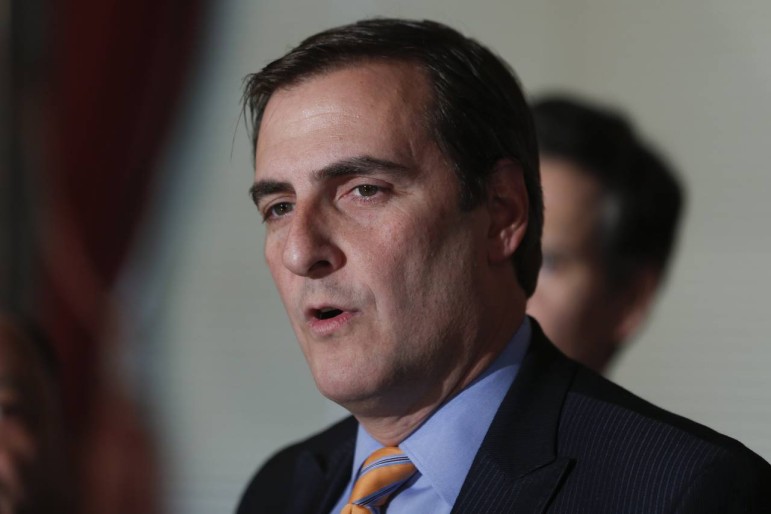
Office of Sen. Gianaris
State Senator Michael Gianaris introduced a bill that would forgive rent for residential and commercial tenants impacted by the COVID-19 pandemic for 90 days.While Governor Andrew Cuomo and Mayor Bill de Blasio make appeals to the White House to assist with the inevitable extensive recovery from the Coronavirus crisis, local elected officials, some business leaders and community housing advocates are calling for new moves to address the economic implications for tenants during the pandemic.
Manhattan Borough President Gale Brewer, Brooklyn Borough President Eric Adams, and Councilmembers Robert Cornegy and Keith Powers on Tuesday proposed what they called a Renter’s Choice policy, which would allow landlords to tap into their security deposits to help tenants meet next month’s rent.
“We face a dual challenge—a health challenge and a economic challenge—and we need to respond to both [challenges],” said Cornegy.
Last year, the tech business Rhino, a start-up residential and commercial property insurance company, proposed a Renter’s Choice and Flexibility Plan. Rhino’s co-founder Ankur Jain said the city has an opportunity to access an untapped reserve of $8 billion from security deposits for immediate relief for tenants who are having difficulties paying next month’s rent during the COVID-19 crisis.
Although there is a 90-day moratorium on evictions ordered by the governor, the impact of the pandemic could be far longer and take the form of a severe spike in unemployment, which would push New Yorkers already living check to check to the brink of homelessness.
Housing Justice for All, a statewide coalition, has called on the city and state to develop a $10 billion relief package that includes a moratorium on rent, mortgage and utility payments. Additionally, the housing advocacy coalition wants the rehousing of every homeless individual using emergency rent assistance and in vacant homes. The risk of viral spread through the homeless shelter system and among the street homeless has been a major concern throughout the public-health emergency (you can read their more about Housing Justice for All package proposal here)
On Monday, State Senator Michael Gianaris introduced a bill that would forgive rent for residential and commercial tenants impacted by the COVID-19 pandemic for 90 days.
Gianaris says the bill is necessary because the current mortarium creates tenant IOUs that might be impossible for many to pay. “It would continue to allow rent obligations to accumulate,” he says.. “And what we have to realize is that these tenants are out of work through no fault of their own. And to expect them to owe, six, seven, eight, ten thousand dollars three months from now is just unrealistic. If they don’t have money, they’re not earning money for the next few months, where’s that money supposed to come from?”
“So you’re only creating, kicking the can down the road a little bit and creating a housing crisis in three months time, when everyone starts getting evicted for not having paid rent for those three months when the whole city was shut down.”
The bill proposes to suspend rent payments and certain mortgage payments for 90 days for residential and/or commercial tenants who have lost income and/or have been forced to close their place of business as a result of government ordered restrictions in response to the outbreak of coronavirus disease.
Additionally the bill would also allow for every residential or small business commercial tenant whose lease expires to have their leases automatically renewed at the existing rent rate.
For landlords, Gianaris’s bill proposes to forgive mortgage payments for those landlords that face financial hardship from the loss of rent payments for commercial or residential property.
“We’re dealing with an unprecedented health crisis, economic crisis. We have effectively pulled the plug on our economy. We have good reason to slow down the spread of coronavirus, but the ripple effects of those decisions are going to be life altering for millions of people,” he said.
Frank Ricci, director of government affairs for the Rent Stabilization Association, said the measures being proposed all make the mistake of generalizing the response to a set of distinct problems.
“Owners will make individual decisions based on their situation and relationship with their tenants (residential and commercial) on a case by case basis. There is no one-size-fits-all,” wrote Ricci. “Owners like everyone else are in dire financial straits and if they can get through the immediate cash flow issue they will figure out a way to do it with their tenants. They should not be forced to do this if they have other considerations to take into account.”











One thought on “Several Proposals Circulate for Giving Relief to Tenants Crushed by COVID-19”
Plz help New Yorkers with rent payments..thxs